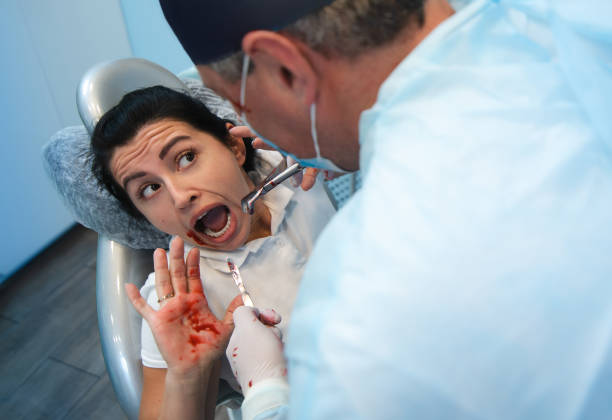Dental trauma can be a frightening and painful experience. Whether it’s a sports injury, a fall, or an accident, knowing how to react quickly and effectively can significantly impact the outcome and potentially save a tooth. This comprehensive guide will walk you through the steps you should take when dental trauma occurs, from immediate first aid to finding the right emergency dental care.

Understanding Dental Trauma
Dental trauma encompasses a wide range of injuries to the teeth, gums, and surrounding tissues. These injuries can include:
- Chipped or fractured teeth: These are common injuries that can range from minor cosmetic issues to more severe damage exposing the nerve.
- Dislodged (luxated) teeth: A tooth may be pushed out of alignment, either inwards, outwards, or sideways.
- Avulsed (knocked-out) teeth: This is one of the most serious dental injuries, where a tooth is completely removed from its socket.
- Root fractures: These fractures occur below the gum line and can be challenging to diagnose.
- Soft tissue injuries: Lacerations, punctures, or contusions to the lips, gums, tongue, and cheeks.
Immediate First Aid for Dental Trauma
The initial moments after a dental injury are critical. Here’s what you should do immediately:
Assessing the Situation
When dental trauma occurs, the first step is to assess the severity of the injury and check for other potential injuries, such as head trauma. If there are signs of severe bleeding, loss of consciousness, or other critical symptoms, prioritize seeking immediate medical attention at an emergency room. This initial evaluation ensures that life-threatening conditions are addressed before focusing on dental issues.
Controlling Bleeding
Bleeding is a common consequence of dental trauma. To manage it effectively, apply direct pressure to the wound using a clean gauze or cloth. For oral injuries, gently rinse the mouth with water to remove blood and debris. This helps reduce discomfort and provides a clearer view of the affected area.
Relieving Pain
Pain from dental trauma can be intense. Over-the-counter pain relievers like ibuprofen or acetaminophen can help alleviate discomfort. Additionally, applying a cold compress to the injured area can reduce swelling and provide temporary relief. These measures are essential for stabilizing the patient until professional care is available.
Handling Knocked-Out Teeth
If a tooth has been knocked out, time is of the essence. Carefully pick up the tooth by its crown (the chewing surface) to avoid damaging the root. If necessary, rinse it gently with water without scrubbing or removing attached tissue fragments. Attempt to replant the tooth in its socket if possible, ensuring it is correctly oriented. If replanting is not feasible, store the tooth in milk, saline solution, or saliva to keep it moist until you reach a dentist. Prompt action within 30 minutes to an hour significantly increases the chances of saving the tooth.
Managing Chipped or Fractured Teeth
For chipped or fractured teeth, start by rinsing the mouth with warm water to clean the area. Save any broken fragments for potential reattachment by your dentist. If sharp edges are causing discomfort or sensitivity, cover them with dental wax or sugarless gum to prevent further damage and protect surrounding tissues.
Repositioning Dislodged Teeth
In cases where a tooth has been dislodged but remains in the mouth, gently attempt to reposition it using finger pressure. Avoid forcing it into place as this could exacerbate the injury. Stabilizing the tooth helps prevent further damage until professional treatment can be sought.
Seeking Professional Dental Care
Regardless of the type of dental trauma sustained, seeking immediate professional care is crucial. Emergency dentists are equipped to evaluate and treat injuries effectively, ensuring optimal outcomes for both functional and aesthetic recovery.
Finding the Right Emergency Dentist
Not all dentists are equipped to handle dental trauma effectively. Look for a dentist with the following qualifications:
- Experience in Trauma Cases: Choose a dentist who has experience in treating dental injuries.
- Availability: Emergency dentists offer after-hours or weekend appointments.
- Advanced Equipment: A modern dental clinic with the latest technology can provide more efficient and effective treatment.
- Calm and Reassuring Demeanor: Dealing with dental trauma can be stressful, so a dentist who can remain calm and reassuring can make the experience less traumatic.
Long-Term Care and Follow-Up
After the initial emergency treatment, follow-up care is essential to ensure proper healing and prevent complications. This may include:
- Regular Check-Ups: Schedule regular check-ups with your dentist to monitor the healing process and address any potential problems.
- Root Canal Evaluation: Teeth that have been replanted or suffered significant trauma may require root canal therapy in the future.
- Orthodontic Treatment: In some cases, orthodontic treatment may be necessary to correct misalignments caused by the injury.
- Prosthetic Replacement: If a tooth cannot be saved, options such as dental implants, bridges, or dentures may be considered to replace the missing tooth.
Prevention of Dental Trauma
While not all dental injuries can be prevented, there are steps you can take to reduce your risk:
- Wear a Mouthguard: If you participate in sports, wear a custom-fitted mouthguard to protect your teeth from impact.
- Use a Seatbelt: Always wear a seatbelt when driving or riding in a car to prevent injuries from accidents.
- Childproof Your Home: Take steps to childproof your home to prevent falls and other accidents.
- Maintain Good Oral Hygiene: Strong, healthy teeth are less likely to be injured. Brush and floss regularly and visit your dentist for regular check-ups.
Conclusion
Dental trauma can be a distressing experience, but knowing how to respond quickly and effectively can make a significant difference in the outcome. By following the steps outlined in this guide, you can minimize the damage, relieve pain, and increase the chances of saving a tooth. Remember, seeking immediate dental care is crucial for the best possible outcome.